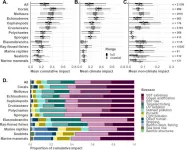(Press-News.org) A drug approved for treating the blood cancer multiple myeloma may offer a safe and effective way to reduce the risk of severe nosebleeds from a rare but devastating bleeding disorder. Hereditary hemorrhagic telangiectasia (HHT), the world's second-most-common inherited bleeding disorder, affects approximately 1-in-5,000 people and can have life-threatening complications, but there are currently no U.S. FDA-approved drugs to treat HHT. The PATH-HHT study, the first-ever randomized, placebo-controlled U.S. clinical trial, evaluated the oral drug pomalidomide, currently approved to treat multiple myeloma, to treat bleeding and disease manifestations in HHT. The trial, which enrolled more than 50 patients at Massachusetts General Hospital (MGH), a founding member of the Mass General Brigham healthcare system, found that the drug resulted in a significant, clinically relevant reduction in the severity of nosebleeds and improved quality of life. Results of PATH-HHT are published in the New England Journal of Medicine.
"The results of our trial demonstrate the clear safety and efficacy of pomalidomide to treat bleeding in HHT, giving these patients a much-needed effective treatment option,” said first author Hanny Al-Samkari, MD, the Peggy S. Blitz Endowed Chair in Hematology/Oncology at Massachusetts General Hospital, Associate Professor of Medicine at Harvard Medical School, classical hematologist and principal investigator at the Mass General Cancer Center. “While much work is still needed to develop additional treatments for HHT, the PATH-HHT study serves as proof of principle that we can develop effective drugs to treat this awful disease."
Patients with HHT suffer from severe, recurrent nose bleeding that severely reduces their health-related quality of life and results in unemployment and social isolation. They also endure chronic gastrointestinal bleeding, which results in severe anemia and dependence on intravenous iron infusions and blood transfusions. They can additionally suffer from vascular malformations in internal organs, like the brain, lungs, and liver, that can cause life-threatening bleeding, strokes, and heart complications.
The PATH-HHT study is a National Institutes of Health-sponsored clinical trial that enrolled patients at 11 centers, including MGH. The trial evaluated pomalidomide to treat disease manifestations in HHT, focusing on the severe nosebleeds that affect almost all patients with this disease. The primary outcome achieved significant improvements in longitudinal nosebleed severity over time in the pomalidomide group versus the placebo group. Additionally, the investigators found substantial improvements in HHT-specific quality of life in patients receiving pomalidomide compared with those receiving placebo.
The PATH-HHT study was intended to enroll 159 participants but because it eclipsed its prespecified threshold for efficacy, it was closed to enrollment early.
"When you do a clinical trial, closing early for efficacy is the best possible outcome," said Al-Samkari.
The most common side-effects of pomalidomide were neutropenia, constipation, and rash, but these were mostly mild and manageable. The authors note that additional studies will be needed to define the mechanisms of action of pomalidomide in HHT—that is, why the drug works for this condition. Future studies will also be needed to determine if the drug could have similar effects in patients with gastrointestinal bleeding or other HHT complications.
Massachusetts General Hospital is a HHT Center of Excellence, as certified by the Cure HHT Foundation, and serves over 500 families with HHT throughout Massachusetts and the rest of New England, plus upstate New York. People additionally travel from far and wide to participate in clinical trial opportunities within the MGH HHT Center. The Center is co-directed by Al-Samkari and Josanna Rodriguez-Lopez, MD, from the Division of Pulmonary and Critical Care Medicine.
"As you can imagine, for a neglected but serious disease with no approved therapies, we had great interest in the PATH-HHT study from patients, and enrolled over 50 patients into this important trial," Al-Samkari said. "This success would not have been possible without the efforts of Pamela Hodges, NP, PhD and the incredible research nurses, coordinators, and associates within the Mass General Cancer Center, as well as my colleagues throughout MGH HHT Center. It has also been my great pleasure to work with Dr. Keith McCrae at the Cleveland Clinic to contribute to this multicenter effort. As a multisystem disease, HHT is very much a team sport."
Authorship: Additional authors include Raj S. Kasthuri, Vivek N. Iyer, Allyson M. Pishko, Jake E. Decker, Clifford R. Weiss, Kevin J. Whitehead, Miles B. Conrad, Marc S. Zumberg, Jenny Y. Zhou, Joseph Parambil, Derek Marsh, Marianne Clancy, Lauren Bradley, Lisa Wisniewski, Benjamin A. Carper, Sonia M. Thomas, and Keith R. McCrae.
Disclosures: Disclosure forms provided by the authors are available with the full text of this article at NEJM.org.
Funding: Funded by the National Heart, Lung, and Blood Institute (UG3HL140097, U24HL140090, and 1K23HL159313).
Paper cited: Al-Samkari H et al. “Pomalidomide for Epistaxis in Hereditary Hemorrhagic Telangiectasia” New England Journal of Medicine DOI: 10.1056/NEJMoa2312749
###
About Mass General Brigham
Mass General Brigham is an integrated academic health care system, uniting great minds to solve the hardest problems in medicine for our communities and the world. Mass General Brigham connects a full continuum of care across a system of academic medical centers, community and specialty hospitals, a health insurance plan, physician networks, community health centers, home care, and long-term care services. Mass General Brigham is a nonprofit organization committed to patient care, research, teaching, and service to the community. In addition, Mass General Brigham is one of the nation’s leading biomedical research organizations with several Harvard Medical School teaching hospitals. For more information, please visit massgeneralbrigham.org.
END
Associate professor of chemical engineering Bryan Berger received funding from the Environmental Protection Agency to reduce the impact of per- and polyfluoroalkyl substances, known as PFAS, in food and farming communities.
The award is part of the over $15 million the EPA granted to 10 institutions for PFAS reduction research, aimed at improving farm viability and increasing knowledge of PFAS accumulation.
Water sample collection for testing in Limestone, Maine. (Contributed photo)
Known as forever chemicals, PFAS are man-made substances that have been used in industry ...
Superintelligence — AI systems that surpass human intelligence — could be just a decade away, raising urgent questions about how to ensure their safety and alignment with human values, according to OpenAI.
These AI systems could be hugely beneficial, but more sophisticated systems create the possibility for unpredictability. Misinterpreting human values or intent, algorithmic biases and security risks are all cause for concern, especially with highly developed AI systems where the potential consequences are far greater.
Yu Meng, assistant professor of computer science at ...
WASHINGTON, D.C.—A new website, AnimalMethodsBias.org, created by the Coalition to Illuminate and Address Animal Methods Bias (COLAAB), provides researchers guidance and resources aimed at helping them successfully publish nonanimal biomedical research by overcoming the preference some peer reviewers have for animal-based research methods.
“We recently found that half of researchers surveyed had been asked by reviewers to add an animal experiment to their otherwise animal-free study,” says Catharine ...
MINNEAPOLIS – People whose diet more closely resembles the MIND diet may have a lower risk of cognitive impairment, according to a study published in the September 18, 2024, online issue of Neurology®, the medical journal of the American Academy of Neurology. Results were similar for Black and white participants. These results do not prove that the MIND diet prevents cognitive impairment, they only show an association.
The MIND diet is a combination of the Mediterranean and DASH diets. It includes green leafy vegetables like spinach, ...
MINNEAPOLIS – A class of drugs for diabetes may be associated with a lower risk of dementia and Parkinson’s disease, according to a study published in the September 18, 2024, online issue of Neurology®, the medical journal of the American Academy of Neurology.
The study looked at sodium-glucose cotransporter-2 (SGLT2) inhibitors, which are also known as gliflozins. They lower blood sugar by causing the kidneys to remove sugar from the body through urine.
“We know that these neurodegenerative diseases like dementia and Parkinson’s disease are common and the number of cases is growing as the ...
SECORE International’s Coral Seeding approach utilizes assisted reproduction, the breeding of corals, for reef restoration. This approach is realized within a training and partner network throughout the Caribbean. Now, a peer-reviewed study shows that all the effort was worthwhile: during the devastating heatwave in the Caribbean in 2023, the young, bred corals out on the reef stayed healthy while most of the remaining wild corals bleached and many died in the aftermath.
The summer of 2023 was deadly for many corals in the Caribbean Basin. An unprecedented heatwave, in intensity as well as in duration, hit the Caribbean with catastrophic ...
A mysterious tusked animal depicted in South African rock art might portray an ancient species preserved as fossils in the same region, according to a study published September 18, 2024 in the open-access journal PLOS ONE by Julien Benoit of the University of the Witwatersrand, Johannesburg, South Africa.
The Horned Serpent panel is a section of rock wall featuring artwork of animals and other cultural elements associated with the San people of South Africa, originally painted between 1821 and 1835. Among the painted figures is ...
Climate change and a range of other human impacts are putting marine animals at risk of extinction – even those living in almost pristine marine habitats and diverse coastal regions – reports a new study by Casey O'Hara of the National Center for Ecological Analysis and Synthesis at the University of California, Santa Barbara, USA, and colleagues, published September 18, 2024 in the open-access journal PLOS ONE.
Human activities on land and sea, in combination with climate change, are degrading coastal ...
Stuttgart – Scientists at the Max-Planck-Institute for Intelligent Systems (MPI-IS) have developed hexagon-shaped robotic components, called modules, that can be snapped together LEGO-style into high-speed robots that can be rearranged for different capabilities. The team of researchers from the Robotic Materials Department at MPI-IS, led by Christoph Keplinger, integrated artificial muscles into hexagonal exoskeletons that are embedded with magnets, allowing for quick mechanical and electrical connections. The team’s work, “Hexagonal electrohydraulic modules for rapidly reconfigurable high-speed robots” will be published in Science ...
RICHLAND, Wash.—After thousands of years as a highly valuable commodity, silk continues to surprise. Now it may help usher in a whole new direction for microelectronics and computing.
While silk protein has been deployed in designer electronics, its use is currently limited in part because silk fibers are a messy tangle of spaghetti-like strands.
Now, a research team led by scientists at the Department of Energy’s Pacific Northwest National Laboratory has tamed the tangle. They report in the journal ...






